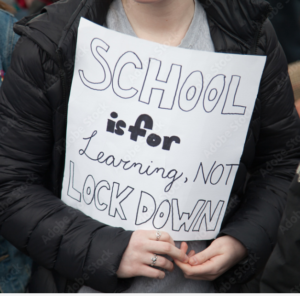
Another senseless shooting by a 6-year-old first-grader at an elementary school in Newport News, VA, triggers strong emotions and sympathy from each of us. How could this happen? Is this the beginning of a world gone mad where a 1st-grade classroom is a site of anger and violence? First, we all wish the victim recovers and the child and his family get the support and professional help they need.
It will take time for all the children, education professionals, and families in Richneck Elementary School to heal from the emotional trauma. What actions do we take for the rest of us, parents, teachers, and leaders? Within the thoughts expressed by the many public upon hearing of this tragedy, there are calls for “hardening elementary schools” with metal detectors, random bag checks, and transparent backpacks. Social media provides a vehicle to post words while our reactions are strong and emotions are raw. Putting emotions into words may help us to relieve the stress and frustration from trauma. However, it is never healthy to plan actions based on emotions.
In short-term actions, we need to take care to hug our friends and family as a reminder of the fragility of life and harmony. As parents and educators, we must listen to and support our children to be sure they get the mental health support and love they need. We also need to continue to adopt safety and security procedures. It is with long-term action that we need to be thoughtful rather than emotion-driven.
Schools are remarkable learning spaces, sometimes chaotic, always challenging, and often inspirational. I learned this not from reading but from experience as an educator listening and observing students and teachers in hundreds of schools (both great and not-so-great). Schools are not impersonal dispensers of wisdom or supervised daycare for children, although schools do those things. Education professionals stimulate student learning by first developing trusting relationships with students and facilitating social interaction where students learn as a group. Students on their own can acquire information from a book or a digital source. But transformational learning comes from people you respect, trust and admire, all done with social interaction. Think about the difference between learning by reading a book on your own versus a book club. Deep learning is social.
Some of my most powerful perceptions of effective schools have come from students’ honest words about how the school has impacted them. I recall one female student in a large urban high school and her response regarding school security. I often ask the question of students, “How would you change this school?” This young student lamented the requirement for student IDs and entry procedures from security staff. She was a Senior and arrived at school one morning and had forgotten her student ID. The security guard at the entrance, whom she had seen every morning for more than three years and whom she knew by name, asked for her ID. Since she did not have it, he asked her to leave and retrieve it before she should enter the school, even though he knew she was a student at the school. The security guard was doing his job and could have been reprimanded for letting the student in without the proper ID. The student added to me, “This school was becoming more like a prison than a school.” I have never forgotten this comment.
If we deal with weapons and violence in a manner that appears to the students as something other than a welcoming refuge that respects and trusts them, we will have lost the purpose of schools. Our actions to protect students should be thoughtful in a way that benefits students accepting there will be infrequent tragic violence that will tug at our emotions. Our children deserve schools that are friendly, remarkable learning spaces.
